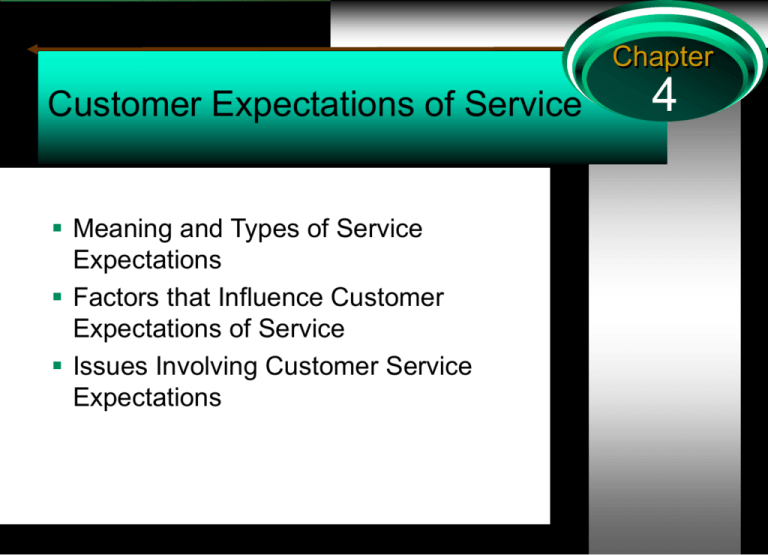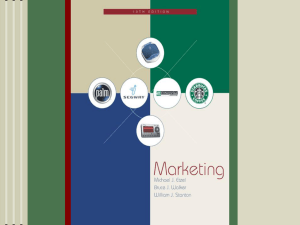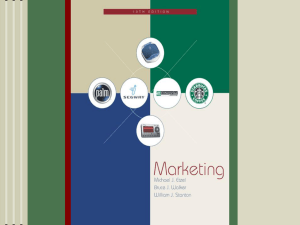
Chapter
Customer Expectations of Service
Meaning and Types of Service
Expectations
Factors that Influence Customer
Expectations of Service
Issues Involving Customer Service
Expectations
4
Customer Expectations of Service
(Chapter 4)
Customer Expectations:
Beliefs about service delivery that function as standards or
reference points against which performance is judged (p. 81)
McGraw-Hill/Irwin
© 2006 The McGraw-Hill Companies, Inc. All rights reserved.
Figure 4.2
Possible Levels of Customer Expectations
McGraw-Hill/Irwin
© 2006 The McGraw-Hill Companies, Inc. All rights reserved.
Customer Expectations (p.86)
Desired service: the level of
service the customer hopes to
receive - the “________” level
of performance.
Adequate Service: the level of
service customer will accept.
Desired Service
Zone of
Tolerance
Adequate Service
McGraw-Hill/Irwin
© 2006 The McGraw-Hill Companies, Inc. All rights reserved.
Figure 4.5
Zones of Tolerance for
Different Service Dimensions
Desired Service
Level
of
Expectation
Zone of
Tolerance
Desired Service
Adequate Service
Zone
of
Tolerance
Adequate Service
Most Important Factors (reliability)
Least Important Factors
(tangibles)
As a service dimension increases in importance, zone of tolerance narrows and adequate
service levels increase
McGraw-Hill/Irwin
© 2006 The McGraw-Hill Companies, Inc. All rights reserved.
Figure 4.6
Factors That Influence Desired Service
Lasting Service
Intensifiers
Desired Service
Personal Needs
Zone
of
Tolerance
Adequate Service
McGraw-Hill/Irwin
© 2006 The McGraw-Hill Companies, Inc. All rights reserved.
Factors that Influence Desired Service
Personal Needs: physical, social, psychological, and functional
Lasting Service Intensifiers: individual, stable factors that lead to
heightened sensitivity to service.
Derived service expectations: expectations driven by another person or
group of people.
Personal service philosophy: customer’s underlying generic attitude
about the meaning of service and the proper conduct of service
providers
McGraw-Hill/Irwin
© 2006 The McGraw-Hill Companies, Inc. All rights reserved.
Figure 4.7
Factors That Influence Adequate Service
Temporary Service
Intensifiers
Desired Service
Perceived Service
Alternatives
Self-Perceived
Service Role
Zone
of
Tolerance
Adequate Service
Predicted
Service
Situational
Factors
McGraw-Hill/Irwin
© 2006 The McGraw-Hill Companies, Inc. All rights reserved.
Factors That Influence Adequate Service
Factors that influence adequate service
expectations are ____________ in nature and
fluctuate ________ than factors that influence
desired service expectations
McGraw-Hill/Irwin
© 2006 The McGraw-Hill Companies, Inc. All rights reserved.
Factors that Influence Adequate Service
Transitory service intensifiers: temporary, short-term, individual
factors that make a customer more aware of the need for service.
Ex: Personal emergency situations raise the level of adequate service
expectations
Perceived service alternatives: other providers from whom the
customer can obtain the same service.
Ex: more perceived alternatives available, higher the levels of adequate
service ______________________________________
McGraw-Hill/Irwin
© 2006 The McGraw-Hill Companies, Inc. All rights reserved.
Factors that Influence Adequate Service
Customer’s self-perceived service role: degree to which
customers exert an influence on the level of service they receive.
Ex: If we believe we are doing our part in the delivery, our expectations
of adequate service is heightened
Situational Factors: service performance conditions that are viewed
as ________________________ of service provider.
Ex: Expectations of adequate service is lowered because of situational
factors
Predicted service: level of service we believe we are likely to get.
Ex: If we predict good service, our expectations of adequate service is
likely to be ________________.
McGraw-Hill/Irwin
© 2006 The McGraw-Hill Companies, Inc. All rights reserved.
Figure 4.8
Factors That Influence Desired
and Predicted Service
Explicit Service
Promises
Implicit Service
Promises
Word-of-Mouth
Desired Service
Zone
of
Tolerance
Adequate Service
McGraw-Hill/Irwin
Past Experience
Predicted
Service
© 2006 The McGraw-Hill Companies, Inc. All rights reserved.
Factors that Influence Desired and Predicted
Service
Explicit service promises: personal and non-personal
statements about the service made by the organization to
customers.
“Everything we sell is our own design and our own make and we
guarantee it without reservation” (J Crew)
Implicit service promises: service related ______ that lead to
inferences about what the service should and will be like.
McGraw-Hill/Irwin
© 2006 The McGraw-Hill Companies, Inc. All rights reserved.
Factors that Influence Desired and Predicted
Service
Word of mouth communication: perceived as unbiased.
____________________________________
Past experience: customer’s previous exposure to service that
is relevant to the focal service
McGraw-Hill/Irwin
© 2006 The McGraw-Hill Companies, Inc. All rights reserved.
Issues Involving Customer Service Expectations
Let customers know the reasons desired service is not
being provided at the present time and describe efforts
planned to address them.
Delighting customers may raise expectations and make it
more difficult to satisfy customers in the future.
Developing a customer relationship is one approach for
exceeding customer expectations.
Adequate service expectations rise as quickly as service
delivery or promises rise.
McGraw-Hill/Irwin
© 2006 The McGraw-Hill Companies, Inc. All rights reserved.
Implications for Customers
Set realistic expectations – “expand” your zone of tolerance
Understand your service provider
Be knowledgeable
McGraw-Hill/Irwin
© 2006 The McGraw-Hill Companies, Inc. All rights reserved.







